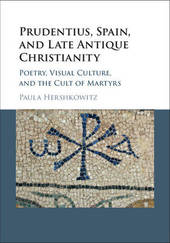
|
Prudentius, Spain, and Late Antique Christianity: Poetry, Visual Culture, and the Cult of Martyrs
Hardback
Main Details
Description
This book provides an innovative approach to the Hispano-Roman Christian poet Prudentius and his poetry. It is a breakthrough in Prudentian scholarship which unifies the differing disciplines of history, archaeology, literature and art history in arguing that Prudentius and his envisaged Spanish audience cannot be fully understood in isolation from their environment in late fourth- and early fifth-century Spain. Paula Hershkowitz focuses on Prudentius' Peristephanon, his collection of verses celebrating the deaths of martyrs, and places these poems within the context of Prudentius' world, uniquely employing material, visual and textual remains as evidence for its religious, social and cultural affiliations. It also draws on this material evidence to contextualise Prudentius' awareness of the significance of the visual as a means of promoting beliefs against the background of this crucial formative period in religious history when many of his Spanish audience were not yet fully committed to the Christian faith.
Author Biography
Paula Hershkowitz is an independent scholar who gained a doctorate in late Roman history from Birkbeck, University of London.
Reviews'Hershkowitz's book is a solid contribution to knowledge on Prudentius and his historical context. Understanding how the poet related to his contemporary audience and material culture in fourth-century Hispania sheds new light on his Peristephanon and refutes a number of tautological assertions found in previous scholarship. This book will definitely be very useful for those interested in Late Antiquity and late Latin poetry, as well as early Christian art, history and society.' Rosario Moreno Soldevila, Bryn Mawr Classical Review '... welcome scholarly monography by Paula Hershkowitz ... has a firm grasp of the archaeological literature in Spanish and English and introduces English-speaking readers to a range of materials that they would otherwise be unlikely to know. The Spanish bibliography is extraordinarily rich and extensive, and Hershkowitz elegantly negotiates the two different scholarly worlds. Her work merits a place next to the useful volumes of Michael Kulikowski and Kim Bowes that will be well known to readers.' Plekos
|